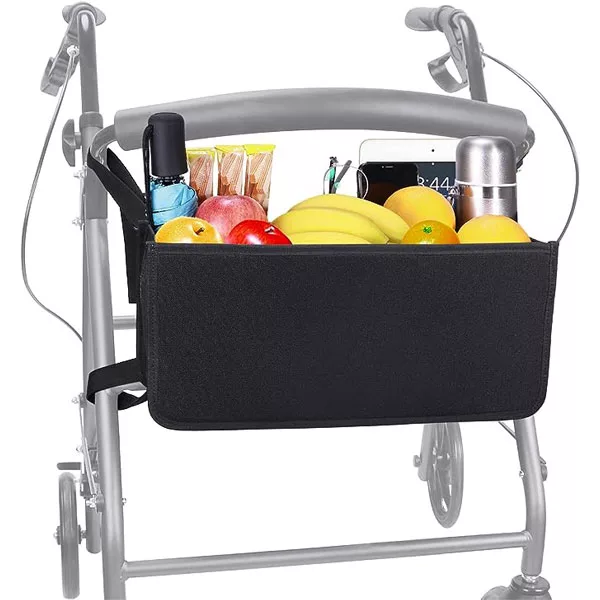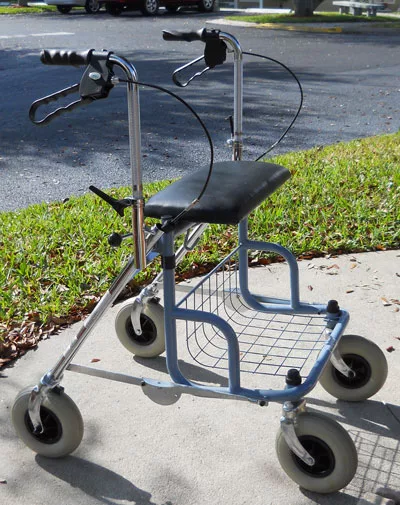Rollators vs. Standard Walkers: The Ultimate Guide for Seniors Seeking Mobility
Table of Contents
Introduction
Ah, the age-old debate: Rollators or standard walkers? It’s like choosing between coffee and tea, or Netflix and Hulu. Jokes aside, when it comes to mobility aids, the choice isn’t always straightforward.
That’s why we’ve put together this comprehensive guide on “Rollators vs. Standard Walkers” to help you make an informed decision. Buckle up, or should I say, “lock your wheels,” and let’s dive in!
The Basics: What is a Rollator?
A rollator, often referred to as a “Rolling Walker,” is like the Swiss Army knife of mobility aids. It usually comes with four wheels, a seat, and brakes. It’s designed for those who can walk but need a little help with balance and stability.
So, what is a rollator used for? Well, it’s great for outdoor use, shopping trips, and even has a seat for when you need a breather.
The Old-School Choice: What is a Standard Walker?
Ah, the standard walker—the classic, the original, the “OG” of mobility aids. Unlike its wheeled counterpart, a standard walker has four legs with rubber tips.
It offers excellent stability but requires you to lift it slightly off the ground to move. It’s simple but effective, especially for indoor use.
8 Different Types of Walkers
You might be surprised to learn that walkers come in all shapes and sizes. Here’s a quick rundown of the 8 different types of walkers:
- Standard Walker
- Two-Wheel Walker
- Three-Wheel Walker
- Four-Wheel Walker
- Front Wheel Walker
- Knee Walker
- Hemi Walker
- Pediatric Walker
Each type has its own set of features and benefits, so it’s essential to consult with a healthcare provider to find the one that’s right for you.
If you’re still unsure about which type of walker to choose, check out our comprehensive guide on the Top 5 Best Walkers for Seniors in 2023 for some expert recommendations.
Rollators vs. Standard Walkers: The Showdown
Let’s get ready to rumble! Or, you know, compare mobility aids in a less dramatic fashion. When it comes to rollators vs. standard walkers, here are some key differences:
- Stability: Standard walkers win here. They offer excellent stability but at the cost of speed.
- Ease of Use: Rollators are easier to maneuver but require good hand strength to operate the brakes.
- Versatility: Rollators are more versatile, especially for outdoor use.
Who Should NOT Use a Rollator Walker
Rollators are fantastic, but they’re not for everyone. If you have severe balance issues or lack hand strength to operate the brakes, a rollator might not be the best choice for you. Always consult your healthcare provider for personalized advice.
Rollator vs. Wheelchair: A Quick Comparison
While rollators offer more freedom and mobility, wheelchairs are better for those who can’t walk long distances.
If you’re torn between the two, consider how much walking you’ll realistically be doing.
How to Choose Between a Rollator and a Standard Walker
Choosing between a rollator and a standard walker boils down to your individual needs. Consider the following:
- Where will you use it most? Indoors or outdoors?
- Do you need a seat?
- How much stability do you require?
Real-Life Stories: Seniors Share Their Experiences
When it comes to mobility aids, nothing beats hearing from those who’ve been there, done that. So, we’ve gathered some real-life stories from seniors who’ve navigated the rollator vs. standard walker debate. Grab a cuppa, and let’s hear what they have to say!
Martha, 72 – Team Rollator “I used to trip over my standard walker all the time, but my rollator has been a game-changer! I can go shopping, take it to the park, and it even has a seat for when I need to rest. It’s like my little shopping cart, but way cooler. I’ve named it ‘Rolly’—yes, I name my mobility aids, don’t judge!”
George, 79 – Team Standard Walker “I’ve tried both, and I prefer my standard walker for its stability. It’s like having four sturdy legs. I use it mainly indoors, and it’s perfect for that. Plus, it fits easily through all the doorways in my house, which is a big win. I call it ‘Steady Eddie.'”
Clara, 81 – The Switcher “I started with a standard walker after my hip surgery. It was great for stability, but as I got stronger, I found it a bit cumbersome. That’s when I switched to a rollator for my outdoor adventures. Now, I use both depending on where I’m going. It’s the best of both worlds!”
Bob, 76 – The DIYer “I couldn’t decide, so guess what? I customized my standard walker by adding two wheels at the front. It’s not a full-blown rollator, but it gives me that extra bit of mobility. My grandkids think it’s a transformer!”
Sally, 70 – The Social Butterfly “I love my rollator because it’s so versatile. I take it to my weekly book club, and it becomes an instant conversation starter. Plus, the seat is handy for when all the chairs are taken. It’s my go-to for social events.”
Harold, 83 – The Traditionalist “I’ve had my standard walker for over a decade, and it’s never let me down. It’s reliable, sturdy, and gets the job done. Why fix what ain’t broke, right?”
Jenny, 78 – The Trendsetter “I went for a rollator because, let’s be honest, they look sleeker. Mine even has a little basket where I keep my knitting. Who says you can’t be mobile and stylish?”
As you can see, the choice between a rollator and a standard walker can be a deeply personal one, influenced by various factors like lifestyle, physical condition, and even aesthetic preferences.
So take your time, weigh the pros and cons, and maybe even give a few different types a test drive. After all, it’s all about finding what makes you most comfortable and keeps you moving!
Conclusion
So there you have it, folks! The ultimate guide to choosing between a rollator and a standard walker.
Remember, the best mobility aid for you is the one that meets your individual needs. So consult your healthcare provider, and maybe even test drive a few options.
Call to Action
If you’re as intrigued by the world of mobility aids as we are, why stop here? We’ve got something special for you. How about diving into the world of blogging? Trust us, it’s not as complicated as assembling a rollator!
Grab our FREE book, “The Hidden Power of Blogging,” to unlock the secrets of successful online writing. Whether you’re a seasoned blogger or a complete newbie, this book has something for everyone. Click here to get your copy now.
Because let’s face it, the only thing better than a good walker is a good read! 📚😉
Frequently Asked Questions
What’s the difference between a rollator and a standard walker?
A rollator has wheels on all legs and usually comes with a seat and handbrakes. A standard walker has no wheels or has wheels only in the front.
Who should not use a rollator walker?
If you require a lot of upper body support or have balance issues, a rollator may not be the best choice. Consult your healthcare provider for personalized advice.
What are the 8 different types of walkers?
The eight types are: standard, two-wheel, three-wheel, four-wheel, knee, pediatric, hemi, and bariatric walkers. Each serves a specific need and comes with its own set of features.
What is a rollator used for?
A rollator is used to assist with walking and is especially useful for those who may need to stop and rest frequently. The built-in seat allows for breaks when needed.
Rollator vs. Walker: Which is better?
It depends on your needs. Rollators are more versatile but less stable. Walkers offer more support but are less convenient for long distances. Always consult a healthcare provider for personalized advice.
Rollator vs. Wheelchair: What’s the difference?
A rollator is a walking aid, while a wheelchair is a seated mobility device. Rollators are for those who can walk but need some support, whereas wheelchairs are for those who cannot walk or stand for long periods.
How do I adjust the height of my walker or rollator?
Most walkers and rollators have adjustable legs. Consult the user manual for specific instructions, or ask your healthcare provider to assist you in making adjustments.
Are there specialized walkers for different terrains?
Yes, some walkers and rollators are designed for rough or uneven terrains. Look for features like larger wheels and enhanced suspension if you plan to use it outdoors frequently.
Are there specialized walkers for different terrains?
Yes, some walkers and rollators are designed for rough or uneven terrains. Look for features like larger wheels and enhanced suspension if you plan to use it outdoors frequently.
Can I travel with my walker or rollator?
Absolutely! Many models are foldable and can be easily stored for travel. Just make sure to check the dimensions if you plan to take it on a plane.
How do I maintain my walker or rollator?
Regular cleaning and occasional lubrication of moving parts are essential. Always check for wear and tear, especially on the wheels and handgrips.







